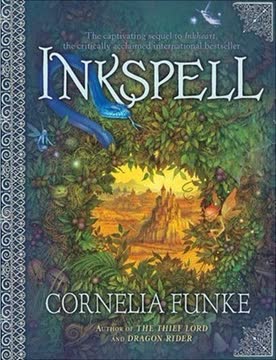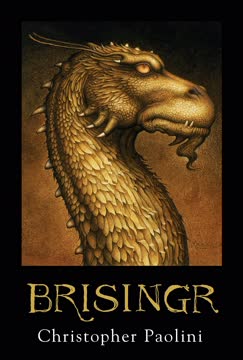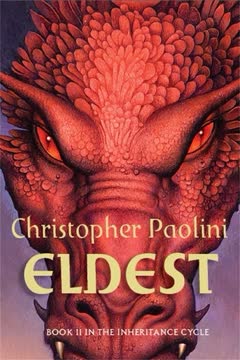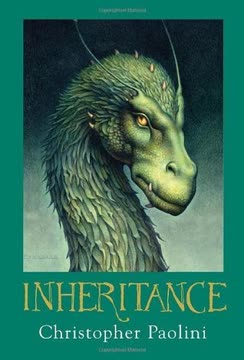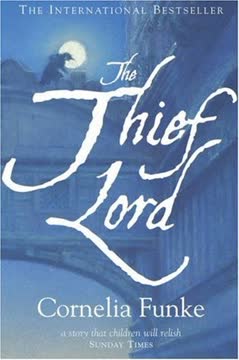Plot Summary
Dustfinger's Return and Farid's Quest
Dustfinger, the fire-eater, finally returns to the Inkworld, a place he has longed for over ten years. His joy is tempered by the absence of Farid, his devoted apprentice. Determined to follow Dustfinger, Farid seeks Orpheus, a reader with the power to send him into the book. Betrayed by Orpheus, Farid turns to Meggie, who uses her own reading abilities to transport them both into the Inkworld. Their journey is fraught with danger, as they navigate the treacherous forest and its many inhabitants, setting the stage for a tale of adventure and peril.
Meggie's Dangerous Decision
Captivated by the stories of the Inkworld, Meggie decides to join Farid in his quest to find Dustfinger. Despite her father's warnings about the dangers of the Inkworld, she is drawn to the idea of experiencing the magical world firsthand. Leaving a letter for her parents, she uses Orpheus's words to read herself and Farid into the story. Her decision leads to a journey of self-discovery, as she learns about the power of words and the responsibilities that come with them, facing the reality of the Inkworld and its challenges.
Mortola's Revenge Unleashed
Mortola, Capricorn's mother, is determined to avenge her son's death. She enlists Orpheus to read her, Basta, and Mortimer (Mo) into the Inkworld, planning to capture Meggie and exact her revenge. Mo is forced to accompany them, leaving Resa and Elinor behind. Mortola's plan is to use Mo's reading abilities to bring Capricorn back to life, but her scheme is fraught with danger and uncertainty. Her obsession with revenge blinds her to the risks involved, setting in motion a chain of events that threaten the lives of Meggie and her family.
Fenoglio's World and New Challenges
In the Inkworld, Meggie and Farid encounter Fenoglio, the author of Inkheart, living among the strolling players. Fenoglio is delighted to see Meggie, believing her presence will help him regain control of the story. However, the Inkworld is not as he imagined, and his creations have taken on lives of their own. The death of Cosimo the Fair has left the Laughing Prince in mourning, and the Adderhead's influence is growing. Fenoglio must navigate the complexities of his own world, grappling with the consequences of his storytelling.
The Adderhead's Ruthless Ambitions
The Adderhead, a fearsome ruler, seeks to expand his dominion across the Inkworld. His desire for eternal life drives him to make a pact with Orpheus, a reader with the power to alter reality. The Adderhead's ambitions threaten the fragile peace of the realm, as he employs his men, including the sinister Piper, to enforce his will. The stakes are high, and the characters must navigate a world where alliances are fragile, and betrayal lurks around every corner. The Adderhead's machinations set the stage for a conflict that could change the Inkworld forever.
A Desperate Plan Unfolds
Fenoglio devises a bold plan to alter the course of events, enlisting Meggie's help to read his new words into reality, hoping to bring back Cosimo, a prince who could challenge the Adderhead's rule. However, the plan is fraught with danger, as the power of words can have unintended consequences. Meggie's ability to bring stories to life is both a gift and a curse, as she grapples with the responsibility of wielding such power. The success of their plan hinges on their ability to outwit their enemies and stay true to their cause.
Dustfinger's Sacrifice and Farid's Return
In a desperate attempt to save Farid, Dustfinger summons the White Women, offering his life in exchange for the boy's. Farid is revived, but Dustfinger's sacrifice leaves a void. Roxane mourns, and Farid is consumed by guilt and determination to bring Dustfinger back. The story of Dustfinger's selfless act spreads, leaving a lasting impact on those who knew him. His legacy of bravery and love continues to inspire, as Farid clings to the hope of seeing Dustfinger return.
Mo's Defiance and the Bluejay's Mask
Mo's actions in the forest, where he fights fiercely to protect the freed prisoners, earn him the respect and fear of the robbers. The Black Prince offers him the Bluejay's mask, symbolizing his new identity. Mo, though reluctant, accepts the role, understanding the power and responsibility it brings. The mask becomes a symbol of hope and resistance against the Adderhead's tyranny, as Mo's leadership and bravery inspire those around him to stand against oppression.
A New Beginning in Ombra
With the Adderhead's threat still looming, Mo, Meggie, and the others seek refuge in Ombra. The Black Prince offers them a place among his people, and they begin to rebuild their lives. Farid remains determined to bring Dustfinger back, while Mo and Meggie find solace in their new roles. The future is uncertain, but hope persists as they embrace their new beginning, finding strength in their bonds and the promise of a brighter tomorrow.
Characters
Meggie
Meggie is the daughter of Mo and Resa, with the rare ability to read characters in and out of books. Her fascination with the Inkworld leads her to make the dangerous decision to enter it herself. Throughout her journey, she grapples with the consequences of her actions and the responsibilities that come with her gift. Her character is defined by her courage, curiosity, and a deep love for her family, which ultimately drives her to seek a way back home.
Dustfinger
Dustfinger is a fire-eater who longs to return to the Inkworld after being read out of it by Mo. His journey is one of longing and redemption, as he seeks to reunite with his family and find peace in the world he once called home. Dustfinger's character is marked by his complex emotions and the scars of his past, both literal and metaphorical. His relationship with Farid is central to his story, as he grapples with the responsibilities of mentorship and friendship.
Farid
Farid is a boy read out of Tales of the Arabian Nights by Mo, who becomes devoted to Dustfinger. His journey is driven by his desire to find Dustfinger and warn him of the dangers that await. Farid's character is defined by his loyalty, resourcefulness, and a deep-seated need for belonging. His relationship with Meggie is complex, as he struggles with his feelings for her and his loyalty to Dustfinger.
Mortimer (Mo)
Mo, also known as Silvertongue, is Meggie's father and a skilled bookbinder with the ability to read characters out of books. His journey is one of love and sacrifice, as he is forced to follow Meggie into the Inkworld to protect her from Mortola's revenge. Mo's character is marked by his deep love for his family and his struggle to control the power of his voice, which has brought both wonder and tragedy into their lives.
Resa
Resa, Mo's wife and Meggie's mother, has returned from the Inkworld after years of captivity. Her journey is one of healing and reconciliation, as she grapples with the memories of her time in the Inkworld and the loss of her voice. Resa's character is defined by her strength, resilience, and the deep bond she shares with her family. Her presence is a source of comfort and stability for Meggie and Mo.
Mortola
Mortola, also known as the Magpie, is Capricorn's mother and a ruthless antagonist. Her journey is driven by her desire for revenge against Mo, whom she blames for her son's death. Mortola's character is marked by her cunning, cruelty, and a single-minded pursuit of vengeance. Her actions set in motion a chain of events that threaten the lives of Meggie and her family.
Orpheus
Orpheus is a reader discovered by Dustfinger, who claims to have the ability to read and write characters in and out of books. His journey is one of ambition and betrayal, as he seeks to prove his superiority over Mo and Meggie. Orpheus's character is defined by his arrogance, insecurity, and a deep-seated need for recognition. His actions have far-reaching consequences for the characters in the story.
Fenoglio
Fenoglio is the author of Inkheart, who finds himself living in the world he created. His journey is one of reflection and adaptation, as he grapples with the consequences of his storytelling and the changes that have occurred in the Inkworld. Fenoglio's character is marked by his wit, creativity, and a deep love for the world he has brought to life. His relationship with Meggie is central to the story, as they work together to navigate the challenges of the Inkworld.
The Adderhead
The Adderhead is a warmongering tyrant who seeks to expand his power across the Inkworld. His journey is one of conquest and domination, as he uses fear and violence to achieve his goals. The Adderhead's character is defined by his ruthlessness, cunning, and a deep-seated fear of death. His presence looms large over the story, as he poses a constant threat to the peace of the Inkworld.
The Black Prince
The Black Prince is a master knife-thrower and the leader of the Motley Folk, a band of entertainers and outcasts. His journey is one of leadership and resistance, as he navigates the challenges of the Inkworld and the threats posed by the Adderhead. The Black Prince's character is marked by his charisma, loyalty, and a deep commitment to his people. His relationship with Dustfinger is central to the story, as they share a bond forged in the fires of adversity.
Plot Devices
Reading Characters In and Out
The ability to read characters in and out of books is a central plot device in the story. This power, possessed by Mo, Meggie, and Orpheus, allows them to bring fictional characters to life and transport themselves into the world of Inkheart. However, this ability comes with significant risks, as it can lead to unintended consequences and disrupt the balance between the real world and the fictional one. The characters must navigate the challenges and responsibilities that come with this power, as they grapple with the impact of their actions on both worlds.
The Inkworld
The Inkworld is a richly imagined setting that serves as the backdrop for the story. It is a world of magic, danger, and intrigue, where characters from the book Inkheart come to life. The Inkworld is governed by its own rules and hierarchies, with powerful rulers like the Adderhead and the Laughing Prince vying for control. The setting is a character in its own right, shaping the events of the story and influencing the actions of the characters. The Inkworld's beauty and peril are central to the narrative, as the characters navigate its challenges and uncover its secrets.
Revenge and Redemption
Revenge and redemption are key themes in the story, driving the actions of characters like Mortola, Mo, and Dustfinger. Mortola's desire for revenge against Mo sets the plot in motion, as she seeks to avenge her son's death. Mo's journey is one of redemption, as he seeks to protect his family and make amends for the unintended consequences of his actions. Dustfinger's quest for redemption is intertwined with his longing for home and his desire to protect those he loves. These motivations create tension and conflict, propelling the characters forward and shaping the narrative.
Analysis
"Inkspell" delves into the complexities of power and responsibility, exploring the consequences of wielding such power through the ability to read characters in and out of books. The narrative examines the impact of words and storytelling, highlighting the delicate balance between creation and destruction. Themes of revenge and redemption are woven throughout the story, as characters grapple with their past actions and seek to make amends. The Inkworld serves as a rich backdrop for these explorations, offering a magical yet perilous setting that challenges the characters and tests their resolve. Ultimately, "Inkspell" is a tale of courage, love, and the enduring power of hope, as characters navigate a world where the lines between fiction and reality blur, and the stakes are higher than ever.
Last updated:
FAQ
0. Synopsis & Basic Details
What is Inkspell about?
- A Journey into Fiction: Inkspell follows Meggie, a young girl with the rare ability to read characters out of books, as she ventures into the Inkworld, the fantastical realm from her father's stories. Driven by a longing for adventure and a desire to find Dustfinger, a fire-eater read out of the same book, Meggie and her friend Farid navigate a world of princes, fire-elves, and dangerous tyrants.
- The Price of Words: The narrative explores the profound consequences of bringing fiction to life, as Meggie's father, Mo (Silvertongue), and mother, Resa, are drawn back into the Inkworld by the vengeful Mortola. Their journey becomes a desperate struggle for survival against the ruthless Adderhead and his forces, while Fenoglio, the Inkworld's author, grapples with his creations taking on a life of their own.
- Identity and Destiny: At its core, Inkspell is a tale of identity, sacrifice, and the enduring power of stories. Characters confront their written destinies, forge new paths, and discover hidden strengths, blurring the lines between author, reader, and character in a world where words hold ultimate magic and peril.
Why should I read Inkspell?
- Immersive World-Building: Dive into Cornelia Funke's richly imagined Inkworld, a place where every tree whispers and fairies dance, offering a truly immersive escape. The vivid descriptions and sensory details make the fantastical feel tangible, drawing readers deep into its unique blend of magic and medieval realism.
- Complex Character Arcs: Witness profound transformations as characters like Mo, Meggie, and Dustfinger grapple with their identities, past mistakes, and the weight of their choices. Their emotional journeys, from Mo's reluctant heroism to Dustfinger's ultimate sacrifice, provide deep psychological engagement and resonate long after the final page.
- Celebration of Storytelling: Inkspell is a meta-narrative that celebrates the power of words, exploring how stories shape reality, identity, and destiny. It's a love letter to books, highlighting the magic of creation and the profound connection between authors, readers, and the worlds they inhabit, making it a must-read for bibliophiles.
What is the background of Inkspell?
- A World Born from Words: Inkspell is set primarily in the Inkworld, a medieval-inspired fantasy realm created by the author Fenoglio, which exists within the pages of the book Inkheart. This world is characterized by its feudal society, warring principalities (Lombrica and Argenta), and a unique ecosystem of magical creatures like fire-elves, water-nymphs, and glass men, all sprung from Fenoglio's imagination.
- Consequences of the First Book: The story directly follows the events of Inkheart, where Mo's ability to read characters out of books led to the escape of villains like Capricorn and Basta, and the accidental disappearance of Resa and Fenoglio into the Inkworld. This sequel delves deeper into the repercussions of these actions, exploring the moral complexities of altering a fictional reality.
- Feudal Society and Power Struggles: The Inkworld operates under a feudal system, with rulers like the benevolent (but grieving) Laughing Prince and the tyrannical Adderhead vying for control. This political backdrop, marked by poverty, banditry (like the fire-raisers), and the constant threat of war, provides a harsh reality against which the magical elements of the story unfold, influencing character motivations and plot developments.
What are the most memorable quotes in Inkspell?
- "Stories never really end, Meggie," he had once told her, "even if the books like to pretend they do. Stories always go on. They don't end on the last page, any more than they begin on the first page." (Chapter 5):
- Enduring Narrative Truth: This quote from Mo encapsulates the core philosophy of the Inkheart series, emphasizing that stories possess a life beyond their printed pages. It foreshadows the continuous, evolving nature of the Inkworld and the characters' inability to escape their narrative destinies, even when they try to rewrite them.
- "He paid for your life with his own. That's always been the only trade-off that Death will accept." (Fenoglio, Chapter 72):
- The Ultimate Sacrifice Explained: Fenoglio's stark declaration reveals the profound, immutable rule governing life and death in the Inkworld, particularly regarding characters read in and out of stories. This quote directly addresses Dustfinger's sacrifice for Farid, highlighting the theme of redemption through selflessness and the high cost of altering fate.
- "The world existed to be read. And I read it." (L. S. Schwartz, quoted in Chapter 73):
- Meta-Literary Power: This intertextual quote serves as a powerful meta-commentary on the entire Inkheart series, asserting the fundamental truth of the Inkworld: its existence is predicated on being read. It underscores the active role of the reader in bringing stories to life and the profound, almost divine, power of interpretation and engagement with narrative.
What writing style, narrative choices, and literary techniques does Cornelia Funke use?
- Sensory-Rich Prose: Funke employs highly descriptive and sensory language, immersing readers in the Inkworld through vivid sights, sounds, and smells. For instance, descriptions like "the air smelled of overripe berries, fading blossoms, a thousand or more flowers dazing his senses" (Chapter 3) create a tangible, almost edible, atmosphere, enhancing the reader's connection to the fantastical setting.
- Intertextual Allusions & Epigraphs: Each chapter begins with a quote from classic literature, mythology, or poetry, enriching the narrative with layers of meaning and foreshadowing. These epigraphs, ranging from Margaret Atwood to Shakespeare, serve as thematic anchors, inviting readers to draw parallels and deepen their understanding of the story's universal themes of love, loss, and the power of words.
- Multiple Perspectives & Meta-Narrative: The story shifts between the perspectives of various characters (Meggie, Dustfinger, Fenoglio, Mo), offering a multifaceted view of the Inkworld and its conflicts. Funke also uses a meta-narrative approach, constantly reminding readers that the Inkworld is a story, with characters debating their author's intentions and the nature of their own existence, blurring the lines between fiction and reality.
1. Hidden Details & Subtle Connections
What are some minor details that add significant meaning?
- Elinor's Garden as a Microcosm: The empty fairy nests and brownie burrows in Elinor's garden (Chapter 4) subtly symbolize the fragility and impermanence of Inkworld creatures in the real world. This detail underscores the theme of displacement and the difficulty of integrating fantasy into reality, reflecting Elinor's own struggle with loss and her deep attachment to the magical beings.
- Orpheus's Dog, Cerberus: The name of Orpheus's "hellhound," Cerberus (Chapter 2), is a direct mythological allusion that foreshadows Orpheus's role as a deceptive gatekeeper to the Inkworld. It hints at his connection to the underworld and his ability to manipulate passages between worlds, subtly signaling his untrustworthy nature to the astute reader.
- Mo's Bookbinding Tools: Mo's meticulous care for his bookbinding tools (Chapter 12), which he later considers abandoning, highlights his deep connection to the craft and the written word. This detail contrasts sharply with his eventual embrace of a sword, symbolizing his transformation from a gentle creator to a reluctant warrior, forced by circumstances to defend his family in a brutal world.
What are some subtle foreshadowing and callbacks?
- Meggie's Recurring Red Dream: Meggie's unsettling dream of "red, a dull red, shining, wet red" (Chapter 26) subtly foreshadows Mo's shooting by Mortola and the subsequent bloodshed in the Inkworld. This recurring motif links her subconscious fears to the violent reality awaiting her family, emphasizing the pervasive danger of the story.
- Gwin's Prophetic Absence: Dustfinger's decision to leave Gwin behind (Chapter 1) due to Fenoglio's original story where the marten plays a role in his death is a powerful callback when Gwin reappears (Chapter 28). This callback reinforces the idea of a predetermined fate and Dustfinger's desperate attempts to defy it, highlighting the tragic irony of his eventual sacrifice.
- Violante's Fading Birthmark: Fenoglio's words about Cosimo's return causing Violante's birthmark to fade (Chapter 30) subtly foreshadow the immense power of narrative to alter physical reality within the Inkworld. This detail underscores the theme of words as a living force, capable of reshaping not just events but also the very appearance of characters, even if the "new Cosimo" is a fabrication.
What are some unexpected character connections?
- Orpheus's Fanboy Admiration for Fenoglio: Orpheus's childhood letters to Fenoglio (Chapter 52) and his deep admiration for the author, despite his later arrogance, reveal an unexpected, almost pathetic, connection. This highlights Orpheus's underlying insecurity and his desperate desire to be recognized by his literary idol, contrasting sharply with his betrayal of Dustfinger and manipulation of Meggie.
- Mo's Unwitting Embodiment of the Bluejay: Mo's transformation into the legendary robber, the Bluejay (Chapter 59, Chapter 61), is an unexpected connection forged by Fenoglio's writing and the perceptions of the Inkworld's inhabitants. This forces Mo, a gentle bookbinder, into a heroic role he never sought, exploring themes of identity, destiny, and how stories can define a person against their will.
- Roxane and Nettle's Healing Alliance: Roxane's practical healing skills, learned from Nettle (Chapter 8), establish a strong, unexpected connection between Dustfinger's wife and the reclusive forest healer. This bond highlights the resilience and resourcefulness of women in the Inkworld, providing a network of support and knowledge that contrasts with the male-dominated power struggles.
Who are the most significant supporting characters?
- Rosenquartz, Fenoglio's Glass Man: Rosenquartz (Chapter 19) serves as Fenoglio's loyal, albeit grumpy, assistant and a symbolic representation of the Inkworld's unique inhabitants. His constant bickering with Fenoglio and his fragile nature underscore the author's struggles with his creations, while also providing comic relief and a poignant reminder of the delicate balance of the Inkworld.
- Cloud-Dancer, the Loyal Messenger: Cloud-Dancer (Chapter 6) is a crippled tightrope-walker turned messenger, whose unwavering loyalty to Dustfinger and the Black Prince proves crucial. His role highlights the importance of communication and trust in a world rife with betrayal, and his tragic death (Chapter 39) serves as a stark reminder of the Inkworld's dangers and the cost of loyalty.
- Taddeo, the Castle Librarian: Taddeo (Chapter 66), the librarian of the Castle of Night, represents a hidden intellectual and moral compass within the Adderhead's tyrannical regime. His love for books and his quiet defiance against the Adderhead's destructive tendencies connect him to Mo, symbolizing the enduring power of knowledge and art even in the face of oppression.
2. Psychological, Emotional, & Relational Analysis
What are some unspoken motivations of the characters?
- Dustfinger's Paternal Guilt: Beneath Dustfinger's longing for home and his often-gruff exterior lies a deep, unspoken guilt over leaving Farid behind (Chapter 3). His initial joy at returning to the Inkworld is quickly "wilted" by Farid's absence, revealing a profound paternal affection that motivates his later actions and ultimate sacrifice.
- Meggie's Quest for Belonging: Beyond the thrill of adventure, Meggie's dangerous decision to enter the Inkworld (Chapter 4) is subtly driven by a desire to find a place where her unique "Silvertongue" gift is understood and celebrated, and to connect more deeply with her mother's past. It's a search for self-acceptance in a world that often fears her power.
- Mo's Suppressed Rage: Mo's initial calm reaction to Meggie's disappearance and Basta's threats (Chapter 5) masks a simmering rage and fear, which later erupts into violent action as the Bluejay (Chapter 71). His quiet demeanor often hides a fierce protectiveness and a deep-seated anger at the injustices inflicted upon his family, revealing a complex internal struggle.
What psychological complexities do the characters exhibit?
- Fenoglio's Creator's Hubris and Despair: Fenoglio grapples with the psychological complexity of being an author whose creations have taken on a life of their own, often defying his original intentions (Chapter 19). His initial delight turns to despair as the story "develops a will of its own," reflecting the universal struggle of creators to control their art and the unpredictable nature of narrative.
- Orpheus's Insecurity and Grandiosity: Orpheus exhibits a profound psychological complexity rooted in insecurity, masked by grandiosity and arrogance (Chapter 52, Chapter 76). His desperate need for validation, particularly from Fenoglio, and his rage when Meggie surpasses his abilities, reveal a fragile ego constantly seeking to prove his mastery over words, despite his inherent limitations.
- Resa's Enduring Trauma and Resilience: Resa's years of captivity and the loss of her voice (Chapter 4, Chapter 18)
Review Summary
Inkspell receives mixed reviews, with many praising its rich world-building, complex characters, and imaginative plot. Readers appreciate the exploration of the power of words and storytelling. Some find the book too long and convoluted, with pacing issues and underdeveloped characters. The romantic subplots and character growth are generally well-received. Many reviewers note the book's emotional impact, particularly regarding Dustfinger's storyline. Overall, fans of the series enjoy the deeper dive into the Inkworld, while others struggle with the length and complexity.
Tintenwelt Series Series
Similar Books
Download PDF
Download EPUB
.epub digital book format is ideal for reading ebooks on phones, tablets, and e-readers.
